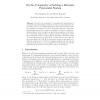Free Online Productivity Tools
i2Speak
i2Symbol
i2OCR
iTex2Img
iWeb2Print
iWeb2Shot
i2Type
iPdf2Split
iPdf2Merge
i2Bopomofo
i2Arabic
i2Style
i2Image
i2PDF
iLatex2Rtf
Sci2ools
104
click to vote
CORR
2011
Springer
2011
Springer
On the Complexity of Solving a Bivariate Polynomial System
We study the complexity of computing the real solutions of a bivariate polynomial system using the recently proposed algorithm Bisolve [3]. Bisolve is a classical elimination method which first projects the solutions of a system onto the x- and y-axes and, then, selects the actual solutions from the so induced candidate set. However, unlike similar algorithms, Bisolve requires no genericity assumption on the input nor it needs any change of the coordinate system. Furthermore, extensive benchmarks from [3] confirm that the algorithm outperforms state of the art approaches by a large factor. In this work, we show that, for two polynomials f, g ∈ Z[x, y] of total degree at most n with integer coefficients bounded by 2τ , Bisolve computes isolating boxes for all real solutions of the system f = g = 0 using ˜O(n8 τ2 ) bit operations1 , thereby improving the previous record bound by a factor of at least n2 .
Related Content
| Added | 13 May 2011 |
| Updated | 13 May 2011 |
| Type | Journal |
| Year | 2011 |
| Where | CORR |
| Authors | Pavel Emeliyanenko, Michael Sagraloff |
Comments (0)

